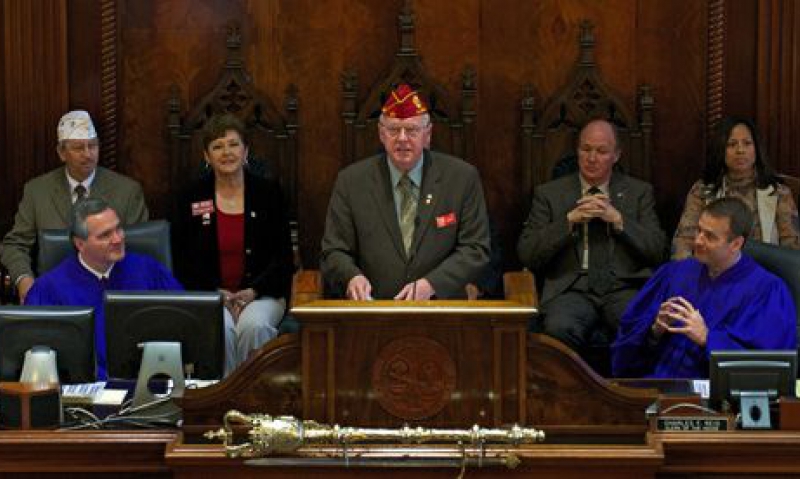
A South Carolina tradition
In a Palmetto State tradition that dates back many years, The American Legion’s national commander addressed lawmakers in the South Carolina State House on March 1.
“Seventy-eight brave men and women from South Carolina have lost their lives in the current wars,” American Legion National Commander Jimmie Foster told the state’s General Assembly. “These stories are important to tell. Not only to educate young people but as a reminder to all of us that freedom isn’t free. Economic times are tough. Governments face large deficits, revenues are down, and nobody likes tax increases. But when you hear someone complain about the cost of a veterans program, remind them of the cost of being a veteran.”
Foster’s invitation to speak came in the form of South Carolina Concurrent Resolution S-343, which states that “with a membership approaching three million, The American Legion has more than 28,000 members in South Carolina and is one of the most influential and prestigious organizations in the United States and is the largest veterans organization in the country…”
Foster and a delegation of Legion family members that included Auxiliary National President Carlene Ashworth were led into the chamber with great pageantry by a sword-carrying sergeant-at-arms and lieutenant governor clad in a purple robe.
Interrupted several times by applause, the tone of the legislature grew serious as the commander shared recent examples of South Carolina veterans who made the supreme sacrifice for their nation. He spoke of 22-year-old Marine Lance Cpl. William H. Crouse IV, a graduate of Clinton High School who – along with his bomb-sniffing dog, Cane – was struck by a bomb blast in Afghanistan on Dec. 21.
“Still alive when the medical helicopter arrived, Lance Cpl. Crouse asked that Cane be put in the helicopter so that he could be saved,” Foster said. “Unfortunately, neither survived. These stories of heroism and sacrifice performed by South Carolinians are repeated again and again, whenever America puts troops in harm’s way.”
State budget cuts have had a negative impact on the state’s ability to serve veterans, according to The American Legion Department of South Carolina. Important constituencies such as special-needs children have been pitted against veterans to compete for scarce funds, an issue that Foster alluded to in his testimony.
“It has come up that exempting veterans from budget cuts in South Carolina will adversely affect programs intended for children,” Foster said. “This is a false choice. Veterans have already made great sacrifice. The American Legion does not offer expertise in some of your other non-veterans-related programs, but it seems to us that if other programs truly have merit, you should be able to find funding without shortchanging or blaming veterans. It is veterans, after all, who have made such budgetary debates possible.”
Pointing out national trends such as veterans homelessness, unemployment, post-traumatic stress and other issues, Foster told lawmakers, “We owe it to our veterans to serve them as well as they have served us.”
The testimony included plenty of praise, as the commander saluted the two Outstanding Members of the South Carolina Legislature, as designated by The American Legion Department of South Carolina for 2011. He also spoke in favor of legislation that would allow for the inclusion of one’s military veterans status on South Carolina drivers licenses.
“States already do this for organ donors,” Foster said. “We call organ donations ‘the gift of life,’ and that is exactly what these transplants provide for countless people. But veterans also provide the gift of life – the American way of life. History indicates that without the sacrifices made by our veterans, America would probably be living under fascist, communist or some other totalitarian rule.”
Foster went to the legislature with a fresh view of today’s military after touring nearby Fort Jackson the day before with Ashworth and members of the Department of South Carolina.
“We made a lot of changes to basic combat training,” said Maj. Gen. James Milano, commanding general of Fort Jackson. “The training is more rigorous and more smartly done. In 1970, one in 20 kids ages 17-24 were obese. Today it’s one in five. We no longer conduct bayonet training, which has not been needed since the Korean War. Today the emphasis is on marksmanship, values and physical training. I am pretty proud of what we produce.”
While Foster was given additional briefings by post drill sergeants and other cadre, Milano cut his briefing short. The general had to attend the funeral of LaShawn D. “Shawn” Evans – killed in Baghdad on Feb. 15.
To read Foster’s testimony before the South Carolina General Assembly, click here. http://www.legion.org/documents/legion/word/SouthCarolLegislature030111.doc
